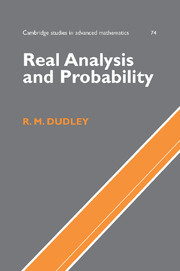Book contents
- Frontmatter
- Contents
- Preface to the Cambridge Edition
- 1 Foundations; Set Theory
- 2 General Topology
- 3 Measures
- 4 Integration
- 5 Lp Spaces; Introduction to Functional Analysis
- 6 Convex Sets and Duality of Normed Spaces
- 7 Measure, Topology, and Differentiation
- 8 Introduction to Probability Theory
- 9 Convergence of Laws and Central Limit Theorems
- 10 Conditional Expectations and Martingales
- 11 Convergence of Laws on Separable Metric Spaces
- 12 Stochastic Processes
- 13 Measurability: Borel Isomorphism and Analytic Sets
- Appendix A Axiomatic Set Theory
- Appendix B Complex Numbers, Vector Spaces, and Taylor's Theorem with Remainder
- Appendix C The Problem of Measure
- Appendix D Rearranging Sums of Nonnegative Terms
- Appendix E Pathologies of Compact Nonmetric Spaces
- Author Index
- Subject Index
- Notation Index
- References
13 - Measurability: Borel Isomorphism and Analytic Sets
Published online by Cambridge University Press: 06 July 2010
- Frontmatter
- Contents
- Preface to the Cambridge Edition
- 1 Foundations; Set Theory
- 2 General Topology
- 3 Measures
- 4 Integration
- 5 Lp Spaces; Introduction to Functional Analysis
- 6 Convex Sets and Duality of Normed Spaces
- 7 Measure, Topology, and Differentiation
- 8 Introduction to Probability Theory
- 9 Convergence of Laws and Central Limit Theorems
- 10 Conditional Expectations and Martingales
- 11 Convergence of Laws on Separable Metric Spaces
- 12 Stochastic Processes
- 13 Measurability: Borel Isomorphism and Analytic Sets
- Appendix A Axiomatic Set Theory
- Appendix B Complex Numbers, Vector Spaces, and Taylor's Theorem with Remainder
- Appendix C The Problem of Measure
- Appendix D Rearranging Sums of Nonnegative Terms
- Appendix E Pathologies of Compact Nonmetric Spaces
- Author Index
- Subject Index
- Notation Index
- References
Summary
Borel Isomorphism
Two measurable spaces (X, ) and (Y, ) are called isomorphic iff there is a one-to-one function f from X onto Y such that f and f−1 are measurable. Two metric spaces (X, d) and (Y, e) will be called Borel-isomorphic, written X ∼ Y, iff they are isomorphic with their σ-algebras of Borel sets.
Clearly, Borel isomorphism comes somewhere between being homeomorphic topologically and being isomorphic as sets, which means having the same cardinality. The following main fact of this section shows that in many cases, surprisingly, Borel isomorphism is just equivalent to having the same cardinality:
Theorem If X and Y are two separable metric spaces which are Borel subsets of their completions, then X ∼ Y if and only if X and Y have the same cardinality, which moreover is either finite, countable, or c (the cardinal of the continuum, that is, of [0, 1]).
Remarks In general, the continuum hypothesis, stating that no sets have cardinality uncountable but strictly less than c, is independent of the other axioms of set theory, including the axiom of choice (see the notes to Appendix A.3). For Borel sets in complete separable metric spaces, however, the continuum hypothesis follows from the axioms, by the theorem about to be proved. Examples of the isomorphism are ℝ ∼ ℝ2 and ℝ ∼ ℝ∖, the space of irrational numbers.
Information
- Type
- Chapter
- Information
- Real Analysis and Probability , pp. 487 - 502Publisher: Cambridge University PressPrint publication year: 2002
